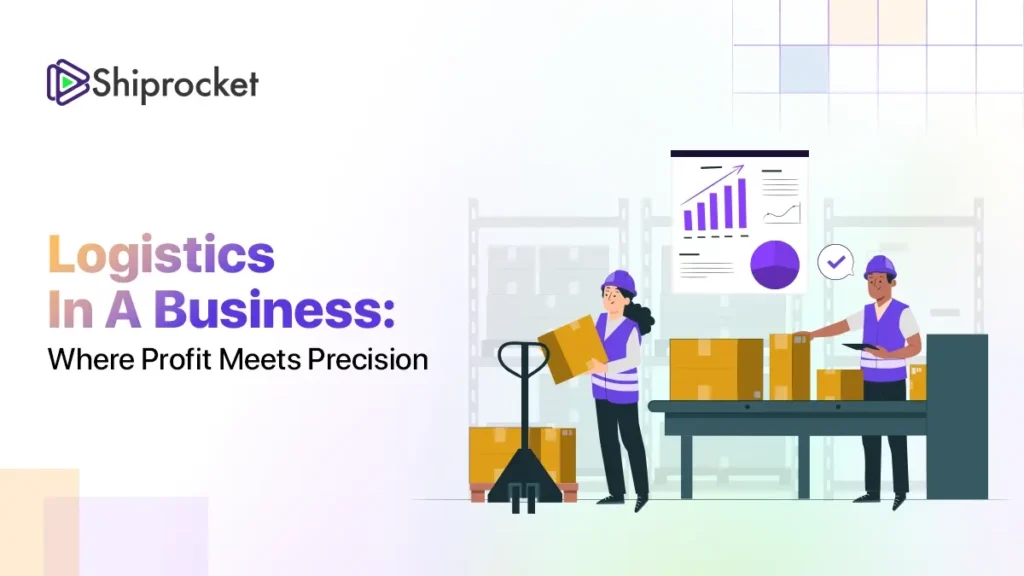Functions, Significance, & Advantages of Logistics in a Company
The term ‘logistics’ refers to the entire process of controlling the sourcing, storing, and delivery of goods to their assigned location. Choosing potential distributors and suppliers and evaluating their efficiency and accessibility are all part of logistics management.
Logistics was the term initially used by the military or defence forces to describe the methods used by military personnel to acquire, store, and transport equipment and supplies. Nowadays, the phrase is frequently used in the corporate world, especially by eCommerce businesses, to describe the management and movement of resources along the supply chain.
Let’s explore logistics in a company in detail.

What is Logistics Management?
In layman’s terms, logistics management strives to have the necessary input or resources at the right time and deliver them to the proper internal or external client in good shape at the right destination. Effectively handling the pipelines, vehicles, storage facilities, and distribution centres that manage oil as it is moved along the supply chain is an example of how logistics is used in the natural gas business.
An efficient supply chain and logistical processes are crucial to cutting costs and boosting business progress. Poor logistics result in late delivery, a failure to satisfy customers, and eventually impact the business negatively.
The logistics complexity in the workflows, combined with the growth of technology in today’s modern world, has led to the development of robust logistics solutions. The logistics management software in businesses speeds up the transfer of resources through the supply chain. Manufacturing organisations now have a choice to decide whether it is more cost-effective to manage logistics internally or to outsource the task to experts.
The Role of Logistics in Businesses
Supply chain management requires an effective logistics component to ensure order fulfillment. It has several transportation methods that deliver products and services at the right time. Here are some of the preliminary functions of logistics in the supply chain:
- Processing of Orders:
Effective logistics typically controls the entire workflow, from when an order is placed to when it is delivered. Nowadays, order processing is a technical operation that heavily depends on the business’s size to fulfill customer orders. The preparation, packaging, and delivery of the orders to the customer are all ensured by a well-managed logistics environment. Inventory picking, packing, shipping, sorting, and order placement are the major functions that logistics handle.
- Warehouse and Inventory Management:
The primary component of a warehouse management system is managing and storing the inventory. It protects the products that will be shipped to customers. Warehouse significantly impacts the supply chain because it is the central site for storing all inventory, including raw materials and finished commodities. Therefore, for the most effective delivery of the goods, it is always advised that warehouses be close to the dealer or distributor’s location.
Logistics processes are about determining how much stock is required and when to order it. Maintaining adequate levels of inventory is crucial for meeting client needs. It aids businesses in keeping track of inventory records for refilling, forecasting product demand, assuring product safety, and other purposes.
- Transportation:
The most essential logistics management function is efficiently moving goods or raw materials across a business’s supply chain. It entails automated routing and route optimisation, significantly reducing costs and determining supply chain management success. Implementing technological developments in logistics operations is necessary in the modern world because it streamlines operations and builds consumer loyalty. A fleet management system helps reduce transportation risk.
- Material Handling:
A perfect logistics safeguard the products across the production, warehousing, and delivery processes. Handling the materials effectively during transportation guarantees that they reach the clients securely.
By analysing product demand and putting in place reliable material handling systems, logistics management plays a crucial role in supporting the various needs of customers. Thus, reducing delivery times and enhancing material handling in the logistics procedures can enhance customer service.
- Forecasting Demand:
Forecasting demand is useful for determining when products or supplies will be needed during the supply chain management process. Process scheduling and planning are crucial for managing the market’s unpredictable situations or circumstances. Therefore, by anticipating what the client wants and completing orders as quickly as possible, forecasting models assist firms in making wise judgements. Therefore, combining cutting-edge technology with robust databases and comprehensive analytics can help your firm take the next step.
- Packing:
Proper packaging is needed to avoid mishaps because the products or goods may break or leak during transit and handling. Logistics management ensures that goods are safely transported from point A to point B in large quantities. Essential steps should be implemented to prevent regulatory problems and reduce transportation costs in the logistics sector. You can protect the product against tampering, damage, and deterioration with the right logistics packaging.
Widely Used Logistics Lingo
Several terms are used in the logistics world. Knowing these can help you navigate the complexities of this function efficiently. The terms include:
- Absolute Minimum Charge: The minimum price charged by the carrier for any product’s shipment.
- Air Freight: Product transportation through air
- Bill of Lading (BOL): A legal document signed between the carrier and shipper containing all information required to process a freight shipment.
- BOL Number: A number that is established by the carrier and references a specific BOL.
- Chargeable Weight: The weight of a shipment is used to determine freight pricing. It is generally calculated based on the dimensional or volumetric weight of the shipment.
- Freight: Any purchase transported from the seller’s address to the buyer’s.
- Full Truckload (FTL): When a shipment takes up a complete trailer while shipping, it is known as a full truckload.
- Inbound Logistics: The storage and transportation processes of incoming goods are called inbound logistics.
- Outbound Logistics: Shipping products from the production facility to the buyer is termed outbound logistics.
- Proof of Delivery: Proof of delivery (POD) is information given by the carrier demonstrating who received the shipment and when.
- Traceability: Traceability is close to real-time or live updates on your shipment.
- True Logistics Partner: A logistics relationship that lasts beyond transactional services and spreads to a consultative approach.
The Significance of Logistics
Logistics is an extremely important part of the SCM process. It forms the execution phase of the supply chain. It provides great accuracy, meets consumer demands and boosts satisfaction. Here’s why logistics is so important:
- Enhancing Business Gains: Logistics boosts profit by improving operational excellence and efficiency that every business needs for expansion and growth.
- Enhanced Consumer Expectations: Different aspects of the supply chain are the logistics process’s essence. Logistics ensures effective consumer and seller communication, providing better services.
- Seamless Delivery: Well-established logistics workflows tend to deliver the right products at the right time. It is vital to have a good track record for order fulfillment.
- Better Warehouse and Inventory Management: Streamlining logistics activities lets you control and monitor your inventory and warehouse operations.
- Risk Management: Logistics processes help your business prepare for risks and enable business owners to understand probable disruptions efficiently.
Logistics Vs Supply Chain Management: Distinguishing the Two
The table below highlights the difference between supply chain management and logistics in a company.
| Logistics | Supply chain management (SCM) |
|---|---|
| Logistics processes are part of supply chain activities. | SCM encompasses several processes, including logistics operations. |
| Logistics enhance meeting consumer demands and expectations. | SCM strives to improve overall business processes and create competitive benefits. |
| Logistics focuses on affordable and efficient deliveries for order fulfillment. | SCM focuses on making work processes more efficient to save both costs and time. |
| Logistics is concerned with the movement of goods within the business and to the consumer’s location. | SCM looks after the development of raw materials into completed goods. |
6 Advantages of Efficient Logistics Management
The major benefits of effective logistics management include the following:
- Minimised Overhead: By proactively handling inventory levels, logistics management helps businesses cut overhead in various areas, including shipping costs and warehouse space required.
- Enhanced Consumer Experience: By precisely and speedily fulfilling orders, brands can improve the customer experience. This raises brand loyalty and future purchases.
- Supporting Growth: Demand forecasting supports growth by precisely helping you understand the inventory needs and stocking in accordance. Moreover, excellent practices for logistics management assist businesses in growing to fulfill more consumer orders.
- Better Visibility: Logistics management enhances supply chain visibility. It enables organisations to better manage costs, identify supply chain and demand plan issues, and acquire insights into prospects.
- Competitive Advantage: Delivering orders on time is a primary component of the customer experience. A strong consumer experience is essential for repeated purchases, enhancing brand reputation, and high net promoter scores, all of which assist a business in attracting new customers. A business can improve its competitive edge and reliably deliver on promises with the help of logistics management.
- Preventing Loss: Several methods of logistics management help prevent loss. First, using the inventory accounting method ensures that your business always knows exactly how much stock it has on hand. Businesses can also track movement and the current location to prevent products from being lost or redirected without warning.
Finally, logistics management can help avoid loss by ensuring that products are stored and transported in ideal conditions. This includes controlling temperature, humidity, and other factors that can damage products.
Conclusion
Logistics is fundamental to any business’s success because it forms the primary section of the execution phase of order fulfillment. Logistics management is essential for the financial stability of a business because it has the power to increase or decrease revenue. RPA, ERP, warehouse management, supply chain management, and other methods can be used by a firm to increase efficiency, reduce expenses, and take control of this crucial business function.
Although logistics processes only form a small portion of the SCM processes, they are one of the most essential. Their efficiency determines overall consumer satisfaction and whether or not the consumer returns to buy from you again. As a result, by cutting costs and improving overall delivery efficacy, optimising the key logistical tasks can help improve overall performance.
The six major logistics functions include order processing, handling of materials, inventory management and control, demand forecasting, packaging, and warehousing.
The four Ps of logistics are product, price, place, and promotion. They are also referred to as the marketing mix.
The three types of logistics are inbound, outbound, and reverse logistics.




